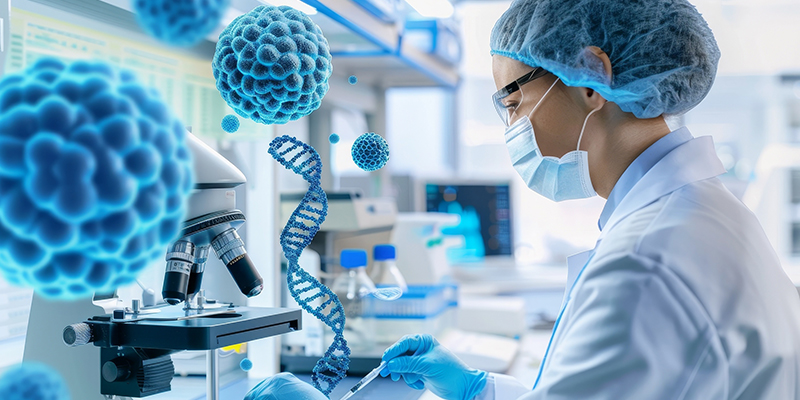Genetic testing has become a vital tool in identifying individuals at higher risk for certain types of cancer. Understanding the genetic makeup that may predispose one to cancer helps patients and families make informed choices about prevention, early detection, and treatment.
What is Genetic Testing?
Genetic testing involves analyzing DNA, the material that carries our genetic information, to look for mutations or alterations in specific genes. Certain mutations are associated with an increased risk of cancer, such as the BRCA1 and BRCA2 gene mutations, which can elevate the risk of breast and
ovarian cancers.
Testing can identify whether someone carries inherited genetic mutations linked to cancer, offering critical information to patients and healthcare providers.
How is Cancer Related to Genetics?
Cancer arises when genetic mutations disrupt the normal growth and division of cells. While many cancers are due to acquired mutations caused by environmental factors like smoking, diet, or exposure to radiation, approximately 5-10% of cancers are hereditary. This means that they are
caused by gene mutations passed down through families.
Hereditary cancers are often associated with patterns within families, where close relatives may have been diagnosed with similar types of cancer, often at a young age. Some common cancers that can be hereditary include:
- Breast and Ovarian Cancer
- Pancreatic Cancer
- Colorectal Cancer
- Prostate Cancer
- Endometrial (Uterine) Cancer
- Melanoma
Who Should Consider Genetic Testing?
Not everyone needs genetic testing. Typically, it is recommended for individuals with:
- Family History of Cancer: Multiple family members with the same type or related types of cancer.
- Early Onset of Cancer: Family members diagnosed with cancer at a young age (before 50).
- Rare Cancers: Family members with rare cancers, such as ovarian cancer or male breast cancer.
- Multiple Cancers: An individual with multiple primary cancers (two or more distinct cancer types).
A genetic counselor or oncologist can help determine if genetic testing is appropriate for you based on your personal and family health history.
The Genetic Testing Process
- Pre-Test Counseling: Before testing, patients usually meet with a genetic counselor who explains the benefits, risks, and potential outcomes of testing.
- Sample Collection: Genetic testing typically requires a simple blood or saliva sample, which is sent to a specialized lab for analysis.
- Results Interpretation: The lab checks for known genetic mutations linked to increased cancer risk.
The results usually fall into one of three categories:- Positive: A mutation linked to cancer risk was found.
- Negative: No mutation was found in the genes tested.
- Variant of Uncertain Significance (VUS): A gene variant was identified, but its association with cancer risk is unknown.
- Post-Test Counseling: A genetic counselor reviews the results and discusses their implications for the individual and their family.
Benefits of Genetic Testing
Genetic testing offers several important benefits:
- Risk Assessment: Helps individuals understand their risk and allows for early interventions, such as
increased surveillance or preventive surgeries. - Informed Medical Decisions: Enables personalized screening plans and preventive measures to
lower cancer risk. - Family Planning: Provides information that may help relatives understand their own cancer risk.
- Treatment Tailoring: Some treatments are more effective for cancers associated with specific genetic mutations. For example, certain medications, such as PARP inhibitors, work well in individuals with BRCA mutations.
Limitations and Considerations
While genetic testing is powerful, it is not a crystal ball. Testing cannot predict whether or when cancer will develop. Some people may experience anxiety related to learning their genetic risks, and in rare cases, genetic information may impact insurance or employment.
It’s essential to approach genetic testing with support from knowledgeable healthcare professionals who can guide decisions based on individual risk factors and family history.
How to Reduce Cancer Risk If You Have a Genetic Mutation
If genetic testing reveals a hereditary cancer risk, there are proactive steps you can take:
- Regular Screening: Increase the frequency of screenings, such as mammograms, colonoscopies, or skin exams, depending on the cancer type.
- Preventive Medications: Certain medications can reduce the risk of developing cancer in high-risk individuals.
- Lifestyle Changes: Adopting a healthy lifestyle can reduce cancer risk, even for those with a genetic predisposition. Avoiding smoking, eating a balanced diet, exercising regularly, and limiting alcohol can support overall health.
- Preventive Surgeries: In some cases, surgeries like mastectomy or oophorectomy (removal of ovaries) may significantly reduce the risk of developing cancer.

